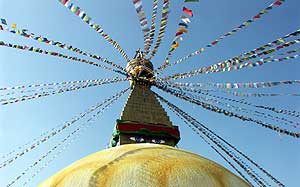
Now that I'm back in the UK I'm sad to admit I'd be hard pressed to recommend Nepal as a holiday destination to anyone other than the most patient or time-rich tourist.
Don't get me wrong -- I had a fantastic time. The scenery is breathtaking and the fabled Nepalese friendliness and hospitality is delightful.
But the nine year conflict between Maoist insurgents and government forces has left the country teetering on the brink of collapse. As the Economist recently put it:
"The country in no way resembles its seductive image as a hashish-tinged Shangri-La of pagodas and Himalayan treks."
The Maoists, who now control significant sections of the country, roam freely through the villages, extorting "donations" from impoverished residents. In a number of the more remote villages I visited the insurgents had cut the telephone connections, severing all links with the outside world.
While I was in the country Amnesty International issued a report condemning the sharp increase in human rights abuses by both sides since the breakdown of the most recent ceasefire in August 2003.
General strikes and vehicle bans (known locally as a chakka jam, meaning "jam the wheels") regularly bring the entire country to a complete standstill -- although the appalling transport infrastructure keeps Nepal at a near-standstill even when the cars and lorries are allowed on the roads.
Needless to say, all this is putting off tourists in their droves. In the case of the lodge I stayed at in Chitwan National Park, 15 guests cancelled on the day I arrived because the threat of further vehicle stoppages meant they couldn't risk leaving Kathmandu and possibly missing their flights. The lodge, with the its large staff of cooks, cleaners, gardeners and guides was completely empty apart from us. It had all the ambience of a Wild West ghost town.
Nepal is a fascinating and beautiful country. But as my colleague Charles Haviland wrote recently, "in Nepal these days the predominant mood is gloom."

0 Comments:
Post a Comment
<< Home